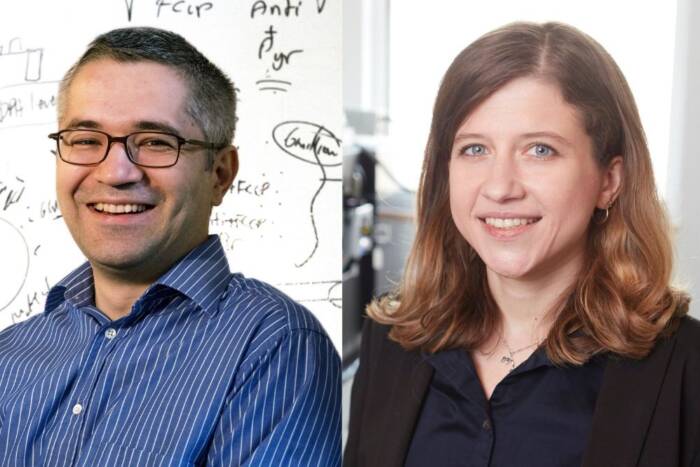Bloomberg, Wilson receive honorary degrees
by TALLEY HENNING BROWN
This year’s honorary doctorate recipients are from very disparate fields. One, an entrepreneur and politician, made his name with a technology that is now ubiquitous in the financial industry. The other, a scientist and author, made his leading the vanguard in the cause of biodiversity conservation. What the two men have in common is a proven dedication to furthering human well-being. The doctor of science, honoris causa — Rockefeller University’s highest honor — is conferred on individuals with exactly that quality. The 2007 honorary doctorates were awarded to New York City Mayor Michael R. Bloomberg and Harvard scholar Edward O. Wilson at the university’s Convocation ceremony June 21.
Mr. Bloomberg, the 108th mayor of the City of New York, is a graduate of Johns Hopkins and Harvard universities. Early experience working as a trader with Salomon Brothers led him to create a computer that channels financial information for user-specific needs. Bloomberg LP, the company founded on that technology in 1981, currently employs over 8,000 people worldwide, serving a wide array of industries.
The mayor is also well known for his broad philanthropic endeavors. With particular interests in improving education and advancing medical research, Mr. Bloomberg has supported — with both money and advocacy — such organizations as the Children’s Health Fund, Prep for Prep and the medical school of Johns Hopkins University, recently renamed The Bloomberg School of Public Health.
Following an introduction by Russell Carson, chair of the university’s Board of Trustees, and conferral of the honorary degree by university president Paul Nurse, Mr. Bloomberg spoke on nature versus nurture, the necessity of expanding our national scientific enterprise and immigration reform. “This graduating class makes an eloquent argument for why America so urgently needs to revise its immigration policies. Our current, wildly unrealistic and unworkable visa restrictions severely handicap international students … and hamper our nation’s ability to compete in a global economy. They sully our reputation in the rest of the world. And perhaps worst of all, they needlessly hold back the advance of scientific knowledge,” said Mr. Bloomberg. “Our duty to nurture scientific excellence requires us all to work for a political environment that truly respects science and scientists.”
E.O. Wilson, widely regarded as one of the world’s most eminent naturalists, is perhaps best known for his theories extending the precepts of natural selection not just to the biological but to the behavioral aspect of human populations. Dr. Wilson helped create several terms including “biodiversity” and “biophilia.” His theories have elucidated how pheromones evolved and how they work. And he created, with colleague Robert MacArthur, the field of island biogeography, the study of how species diversify within a geographically isolated community.
A Harvard graduate, Dr. Wilson has been widely recognized for his efforts on behalf of conservation. The recipient of a National Medal of Science, two Pulitzer Prizes, a Crafoord Prize from the Royal Swedish Academy — often referred to as the Nobel Prize for areas not covered by the Nobel Prize — and Rockefeller University’s own Lewis Thomas Prize for Writing about Science, Dr. Wilson has also been named one of the most influential Americans (Time magazine, 1995), one of the 20th century’s 100 leading environmentalists (Time and Audubon magazines, 2000) and one of the world’s leading intellectuals (Foreign Policy magazine, 2005).
Dr. Wilson’s speech following conferral of the degree was titled “Completing the Great Linnaean Enterprise.” With reference to 18th-century physician-scientist Carolus Linnaeus — who was born 300 years ago and whose system of biological taxonomy is still used by scientists today — Dr. Wilson expounded on the necessity and benefits of conservation and continued exploration of the Earth’s biodiversity. “Whereas we have taken 250 years to discover and diagnose only 10 percent of the species of organisms on Earth, we can now, with technology — an institution newly developed in just the last several years — discover and diagnose almost all of the remaining 90 percent of biodiversity and we can do it in one-tenth the amount of time,” Dr. Wilson said. He went on to describe the international, collaborative efforts resulting in the Encyclopedia of Life, a continuously growing online catalog that aims to collect all known data about every species on the planet. “Species we are now discovering — many of them endangered just at the time when we find them — have begun to pour in. Our lives are almost certainly dependent on them and our well-being on a knowledge of them. This dream, I am now happy to report, has begun to turn into reality.”
Transcript of the remarks made by Mr. Bloomberg
Transcript of the remarks made by Dr. Wilson


